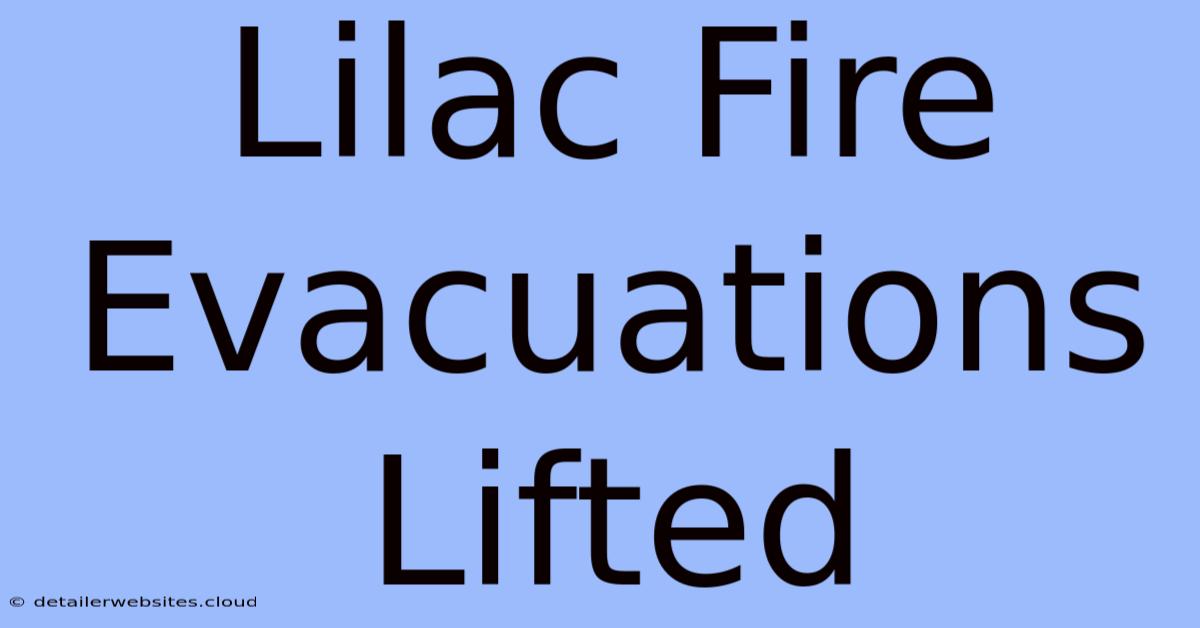Lilac Fire Evacuations Lifted

Discover more detailed and exciting information on our website. Click the link below to start your adventure: Visit Best Website nimila.me. Don't miss out!
Table of Contents
Lilac Fire Evacuations Lifted: A Community Rebuilds
Meta Title: Lilac Fire Evacuations Lifted: Returning Home
Meta Description: Lilac Fire evacuations have been lifted! Learn about the aftermath, rebuilding efforts, and community support following the devastating blaze.
The devastating Lilac Fire, which ripped through Southern California in 2017, left a trail of destruction in its wake. Homes were lost, lives were disrupted, and the community faced a long and arduous road to recovery. But after weeks of uncertainty and fear, the evacuations have finally been lifted, marking a significant turning point in the healing process. This article delves into the aftermath of the Lilac Fire, the challenges faced by residents returning home, and the remarkable resilience of the community in rebuilding their lives.
H2: The Aftermath of the Lilac Fire: A Devastating Toll
The Lilac Fire, fueled by strong Santa Ana winds, burned over 4,100 acres and destroyed more than 150 structures. The immediate aftermath was chaotic, with residents fleeing their homes in the midst of the inferno. The destruction wasn't limited to physical property; the emotional toll on the community was immense. Many lost cherished possessions, irreplaceable heirlooms, and even pets. The sheer scale of the devastation left many feeling lost and overwhelmed. Images of charred remains and displaced families circulated widely, capturing the tragic reality of the situation. [Insert image here: A powerful image depicting the aftermath of the Lilac Fire, showing destruction but also hints of hope.]
H2: Returning Home: Facing the Challenges of Rebuilding
With the lifting of evacuations came a wave of complex challenges. Many returned to find their homes completely destroyed, leaving them with the daunting task of rebuilding from scratch. Others found their properties damaged but still salvageable, facing expensive repairs and the emotional strain of living amidst the wreckage. The process of insurance claims, securing permits, and finding contractors added further layers of complexity.
H3: The Psychological Impact of Returning
The psychological impact of returning home after such a disaster should not be underestimated. Many residents struggled with PTSD, anxiety, and depression. Seeing the destruction firsthand could trigger intense emotional responses. Access to mental health resources and community support groups became crucial in helping residents cope with the emotional aftermath. [Insert link here: To a reputable mental health resource or support group website.]
H2: Community Resilience: A Testament to the Human Spirit
Despite the immense challenges, the Lilac Fire also showcased the incredible resilience and compassion of the community. Neighbors helped neighbors, volunteers mobilized to provide aid, and charitable organizations stepped in to offer support. Fundraisers were organized, donations poured in, and a network of support emerged to assist those affected. This collective effort highlighted the power of community spirit in times of crisis.
H3: The Role of Technology in Recovery
The recovery process was aided significantly by technology. Social media platforms played a crucial role in disseminating information, coordinating aid efforts, and connecting affected individuals with resources. Crowdfunding platforms facilitated fundraising, while mapping tools helped track the fire's path and assess the extent of damage. AI-powered solutions could have played an even larger role, such as predictive modeling to assess risk areas or drone technology for damage assessment. This underscores the importance of incorporating such technologies into future disaster response strategies.
H2: Rebuilding Efforts and Long-Term Recovery
The rebuilding process is a long and complex undertaking. It requires significant financial resources, skilled labor, and effective coordination among various stakeholders, including government agencies, insurance companies, and contractors. Sustainable building practices and fire-resistant materials are crucial in ensuring the community's long-term safety and resilience. [Insert infographic here: Illustrating the stages of the rebuilding process and key challenges.]
H3: Lessons Learned and Future Preparedness
The Lilac Fire served as a stark reminder of the importance of preparedness and mitigation strategies. Improved wildfire prevention measures, early warning systems, and community education initiatives are crucial in minimizing the risk of future disasters. Investing in fire-resistant landscaping, regularly clearing brush, and developing comprehensive evacuation plans are vital steps towards community resilience.
H2: Looking Ahead: Hope and Healing
While the scars of the Lilac Fire will remain for years to come, the lifting of evacuations represents a crucial step towards healing and recovery. The community's unwavering resilience, coupled with the support of local, state, and national organizations, offers hope for a brighter future. The journey to rebuilding may be long and challenging, but the spirit of community continues to shine brightly, illuminating the path forward.
Conclusion:
The Lilac Fire left an indelible mark on Southern California, but the story is not just one of devastation. It's also a testament to human resilience, community spirit, and the power of collective action. As the community rebuilds, the lessons learned will shape future preparedness and strengthen the community's resolve. What role do you think technology can play in supporting future disaster recovery efforts? Share your thoughts in the comments below.

Thank you for visiting our website wich cover about Lilac Fire Evacuations Lifted. We hope the information provided has been useful to you. Feel free to contact us if you have any questions or need further assistance. See you next time and dont miss to bookmark.
Featured Posts
-
Djokovic Beats Alcaraz In Australian Open
Jan 22, 2025
-
Panhandle Hit By Winter Storm Snow
Jan 22, 2025
-
Wildfires In San Diego Live Fire Map
Jan 22, 2025
-
I 10 Closure Florida Winter Storm
Jan 22, 2025
-
Musician Garth Hudson Passes At 87
Jan 22, 2025
